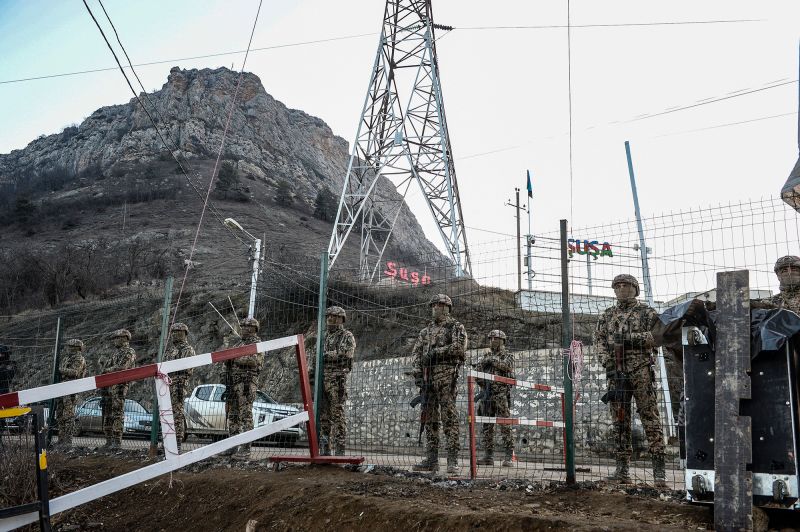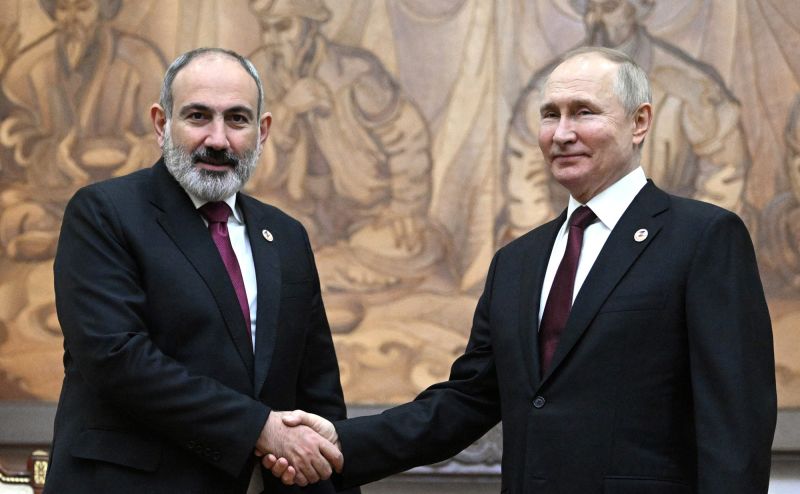
Unveiling the Untold Story: The Real Reasons Behind the Nagorno-Karabakh Control Disputes

A ceasefire halts the conflict in Nagorno-Karabakh, a disputed region where Azerbaijan initiated an offensive against Armenian forces
A ceasefire has been established in Nagorno-Karabakh, the disputed region where Azerbaijan recently initiated a military attack against ethnic Armenian forces. The potential long-term effect on peace remains uncertain, considering that Armenia and Azerbaijan have previously engaged in two wars over Nagorno-Karabakh following the dissolution of the Soviet Union.
What is Nagorno-Karabakh?
: The escalation, resulting in the loss of numerous lives, caused great concern among the global community and questioned Russia's capacity to uphold its influential position as a mediator in the region.Nagorno-Karabakh, referred to as Artsakh by Armenians, is a landlocked area situated in the Caucasus Mountains, within the borders of Azerbaijan. Although formally acknowledged as part of Azerbaijan, it is predominantly inhabited by around 120,000 ethnic Armenians who firmly oppose Azerbaijani authority.
Despite receiving support from Armenia, the region's de facto government lacks official recognition from Armenia or any other nation.
During the time of the Soviet Union, Azerbaijan and Armenia were both part of it. In 1923, Nagorno-Karabakh became an autonomous region within the Republic of Azerbaijan.
In 1988, Karabakh officials declared their intention to join the Republic of Armenia, leading to the outbreak of violence as the Soviet Union started collapsing. This conflict was known as the First Karabakh War and resulted in approximately 30,000 casualties and the displacement of hundreds of thousands of people. The Armenian side gained control of the region as well as seven surrounding districts in Azerbaijan.
In 2020, the Second Karabakh War erupted following years of sporadic clashes between the conflicting parties. Azerbaijan, with support from its historic ally Turkey, emerged victorious within a span of 44 days, reclaiming seven districts and approximately one-third of Nagorno-Karabakh.
The conflict came to an end through negotiations facilitated by Russia, a longstanding supporter of Armenia but also establishing ties with Azerbaijan. The Moscow-brokered agreement stipulated the deployment of around 2,000 Russian peacekeepers to the region. Their presence aims to prevent further encroachments by Azerbaijan and safeguard the Lachin corridor, which serves as the sole road connecting the enclave to Armenia.
Why are tensions flaring again?
Despite the presence of Russia's peacekeeping forces, the region of Nagorno-Karabakh has been subjected to a blockade lasting for a period of nine months. It was in December 2022 when activists supported by Azerbaijan established a military checkpoint along the Lachin corridor, leading to a halt in the importation of crucial food supplies. Consequently, concerns arose that the local residents were left in a dire predicament, facing the possibility of starvation.
In the days prior to the attacks on Stepanakert, the Karabakh foreign ministry cautioned that "there have been consistent troop movements and accumulation of diverse weapons by the Azerbaijani side...preparing for a significant act of aggression."
Azerbaijani servicemen stand guard at a checkpoint at the Lachin corridor, which links Nagorno-Karabakh with Armenia.
Tofik Babayev/AFP/Getty Images
Despite the existing tensions, the escalation on Tuesday was unforeseen. The defense ministry of Azerbaijan claimed that their strikes on Stepanakert were justified, citing an incident where an Azerbaijani vehicle hit a mine that had been planted in an area previously cleared of explosives, resulting in the deaths of two civilians. Additionally, Azerbaijan asserted that its army had encountered "systematic shelling" from the armed forces of Armenia in Nagorno-Karabakh.
Armenia's foreign ministry dismissed allegations that its armed forces were present in Nagorno-Karabakh, as the region is defended by the Artsakh Defense Army. In a statement, the ministry clarified that Armenia's support to Nagorno-Karabakh is solely of a humanitarian nature, due to the ongoing blockade. CNN lacks independent verification for either party's claims.
At least 32 individuals were reported dead and 200 others injured by the time Karabakh authorities reached an agreement on the ceasefire. The Nagorno-Karabakh presidency revealed that their forces were significantly outnumbered by the Azerbaijani forces.
The ceasefire officially commenced on Wednesday at 1 p.m. local time, following the Karabakh presidential office's consent to the "dissolution and complete disarmament of the armed formations."
Children sheltered during Azerbaijan's shelling of Stepanakert overnight Tuesday.
Siranush Sargsyan/AP
What are Azerbaijan and Armenias positions?
Armenia no longer disputes that Nagorno-Karabakh belongs to Azerbaijan's territory. Following the 2020 war, which revealed Armenia's military weakness, Prime Minister Nikol Pashinyan admitted in April this year that his government is prepared to renounce its assertions over the region. Pashinyan argued that "peace is attainable" only if Armenia restricts its territorial aspirations to the boundaries of the former Armenian Soviet Socialist Republic, excluding Nagorno-Karabakh.
Now, President Ilham Aliyev of Azerbaijan is determined to capitalize on what he perceives as his advantage. His rhetoric has steadily become more forceful in recent months. In a speech given in May, Aliyev made a veiled threat of military intervention towards the Armenians in Karabakh, stating: "Either they will surrender and submit themselves, or the situation will take a different course."
On Tuesday, Azerbaijan maintained an unwavering stance, demanding the "immediate and total retreat of the Armenian military" and the "disbandment of the subordinate government" in Nagorno-Karabakh.
Under the ceasefire agreement reached on Wednesday, Nagorno-Karabakh has disbanded its military, while Armenia maintains that it had no military presence in the region. The extent to which Azerbaijan will demand the dissolution of the de facto government remains uncertain.
How are Russia and Turkey involved?
Russia has been a longstanding ally of Armenia, whereas Turkey has consistently provided assistance to Azerbaijan.
During his speech at the 78th session of the United Nations General Assembly on Tuesday, Turkish President Recep Tayyip Erdogan expressed his support for Azerbaijan, stating that Turkey stands behind the actions taken by Azerbaijan to safeguard its territorial integrity. Erdogan emphasized the shared notion of unity between the two nations, referring to them as one nation with two states.
Turkey is accused of engaging in ethnic cleansing towards Armenians during World War I, targeting the Armenian subjects of the Ottoman Empire. Dmitry Peskov, spokesperson for the Kremlin, has expressed concern over the recent increase in tensions and outbreak of hostilities.
Analysts said the effectiveness of Russia's peacekeeping presence, which began after the war in 2020, has diminished over time.
Karen Minasyan/AFP/Getty Images
However, the latest violence came during what some analysts have argued may constitute a fracture in the close relationship between Armenia and Russia.
For decades, Armenia has placed its trust in Russia as the exclusive protector of its security, relying on the purported security assurances provided by the Collective Security Treaty Organization (CSTO), a military alliance consisting of post-Soviet nations that includes Armenia but not Azerbaijan. However, Armenia's dissatisfaction has mounted due to Russia's apparent reluctance or incapability to defend it from Azerbaijani aggression, as relations between Moscow and Baku have strengthened.
With Russia failing to deliver on its commitments, analysts told CNN that Armenia has felt it had little choice but to diversify its security apparatus.
Russian President Vladimir Putin met Armenian Prime Minister Nikol Pashinyan in Bishkek, Kyrgyzstan, in December 2022.
Kremlin
Is Russia's long-standing ally, Armenia, gradually moving away from the influence of the Kremlin? In a surprising turn of events, Armenia recently provided assistance to Ukraine, marking it as their first humanitarian aid sent to the country. Additionally, they conducted joint military exercises with the United States, further indicating a divergence from their traditional alliances. Moreover, Armenia's parliament is currently on the verge of ratifying the ICCs Rome Statute, which would legally bind them to apprehend Russian President Vladimir Putin if he were to visit their territory.
Pashinyan expressed his disapproval of Russia on Tuesday, stating that his government had not been informed by their Russian partners about Azerbaijan's upcoming military operations. According to Armenpress, he commented, "We have not received any information about that operation."
The news of the recent attacks on Nagorno-Karabakh elicited enigmatic responses from prominent figures in Russia who displayed limited sympathy towards Armenia. Margarita Simonyan, the editor-in-chief of state-owned Russia Today, described the news as "tragic, hopeless, and predictable," and further remarked, "the fate of Judas is unenviable."
Previous reporting from CNNs Tim Lister, Gianluca Mezzofiore, Anna Chernova, Nick Paton Walsh, Katherina Krebs, Mariya Knight, Chris Liakos, Maya Szaniecki, Radina Gigova and Alex Hardie.













